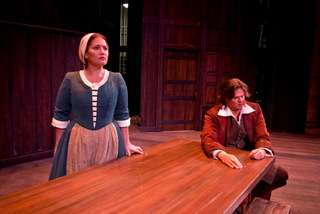|
Back
A Crucible to Heed Sarasota
Sarasota Opera House
03/05/2011 - & March 8, 10, 13, 16, 19, 2011
Robert Ward: The Crucible
Heather Johnson (Elizabeth Proctor), Lindsay Barche (Abigail Williams), Nicole Mitchell (Tituba), Sean Anderson (John Proctor), Jeffrey Tucker (Reverend John Hale), Mathew Edwardson (Judge Danforth)
Sarasota Opera Orchestra and chorus, Roger L. Bingaman (Chorus Master), David Neely (Conductor)
Michael Unger (Director), Michael Schweikardt (scenic design), Howard Tsvi Kaplan (costume design), Ken Yunker (lighting design)

H. Johnson & S. Anderson (© Patricia G. Horwell)
American plays as opera have not always worked. The verdict is still out on Martin David Levyís Mourning Becomes Electra, but Andre Previnís A Streetcar Named Desire was not a success despite the presence of Renee Fleming. William Bolcomís adaptation of another Miller work, A View from the Bridge, does not seem to have caught on. Sarasota Opera has started a new cycle of American classics with Robert Wardís The Crucible based on Arthur Millerís well known play. The opera version premiered at New York City Opera in 1961 and won the following yearís Pulitzer Prize for Music. It has not yet become a repertory standard.
Perhaps this is because Millerís play is so well crafted and exciting that it feels operatic without music. To ask singers to learn roles they will undoubtedly never sing again takes guts. Millerís original has had four Broadway revivals since its 1953 debut and countless productions in regionals and universities throughout the world. There was even a French language movie version with Simone Signoret and Yves Montand released in 1957, not forgetting the American one from 1996 with Daniel Day Lewis, Joan Allen and Wynona Ryder. So audiences might have a sense of overfamiliarity.
Granted the story is heavy and does not make an audience feel good or even satisfied. The feeling of hopelessness it creates is depressing. And works dealing with severe cruelty do not lend themselves to repeated viewings. Raging Bull is a stunning film, but it isnít a piece of delicious fun like the brutality of Inglorious Bustards.
By 1961 when so many composers had replaced melody in favor of the esoteric, Robert Ward gave us a full blown old-fashioned opera. Bernard Stamblerís libretto stays very close to the original play yet eliminates considerably more than half the text without missing any essential plot elements. Wardís unashamed melody creates appropriate character themes, something missing from most contemporary failures. He didnít try to reinvent the wheel; as a result many of todayís critics would find this opera derivative. We must always remember that no one really likes melody except for the audience and the singers.
It is essential to this operaís success that it not become overladen with 1950s politics which seems to accompany any major production of Millerís original. Now we are left with the horrors of religious hysteria; a theme perfect, and still quite unfamiliar in opera.
Sarasota Operaís production is a serious one. At the intermission between acts two and three, it was not uncommon to hear ďDid you have any idea this was going to be so good? Ē. Those unfamiliar with a recording or previous production may have been startled, but those of us more aware of this work found something additional to savor. Good singing for starters.
It is hard to tell if Sean Anderson who played John Proctor, was two-dimensional because the text doesnít allow him more freedom. In his scene with his wife, Elizabeth (the sublime Heather Johnson), however, other than anger towards her, he showed little feeling. In successive performances he will probably find greater depth. Regardless, Anderson has a solid voice that never wavered; he commanded the opera. The strong tenor of Mathew Edwardson made the audience want to hiss the operaís villain, Judge Danforth. Jeffrey Tucker used his gloriously warm bass to create the operaís most pitiable character, Reverend John Hale. Tituba, the Bahamian slave who eventually confesses to deeds she never committed, was sung by Nicole Williams with a voice type rarely heard anymore, a true contralto. Perfect pitch and intonation helped keep this woman strong and proud in spite of the madness surrounding her.
An ongoing problem with English language opera is diction. This performance started off with mushy sound from Lindsay Barcheís Abigail. But by her great scene at the beginning of act three, it was clear that the lack of clarity was the result of impossibly high tessitura or perhaps nerves. Barcheís gorgeous voice kept Abigail terrifying through the trial scene. This is a young singer to keep an eye on.
The smaller roles were well performed, though special mention must be given to the bright beautiful sounds of Dimitrie Laziche as Thomas Putnam, and the Giles Corey of Heath Huberg. When words are so clearly expressed, English supertitles for an English language opera are distracting.
Production values were appropriately severe and the final image of nooses against a haunting lighting design is something few will forget. Reciting took the place of acting through the beginning, though by the second act the characters were interacting with much more realism and the drama took hold. Conductor David Neely and Chorus Master Roger L. Bingaman clearly have an understanding of this work. Though The Crucible is usually offered in American colleges, universities and conservatories, it is conceivable that Sarasotaís masterful production might encourage more prestigious companies to consider it. Singing actors looking for good roles have plenty to savor with what Ward and Stambler created.
The Sarasota Opera Company
Jeff Haller
|